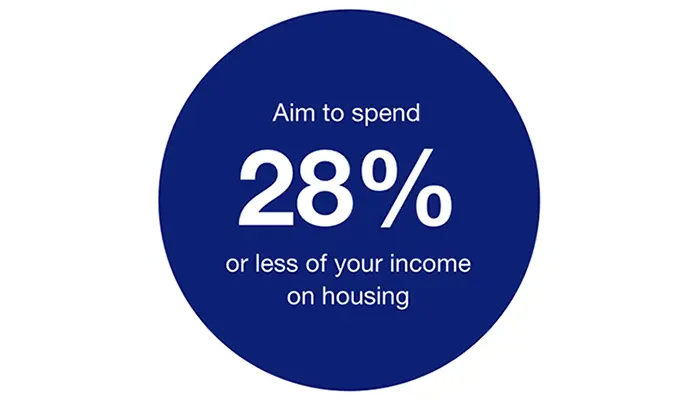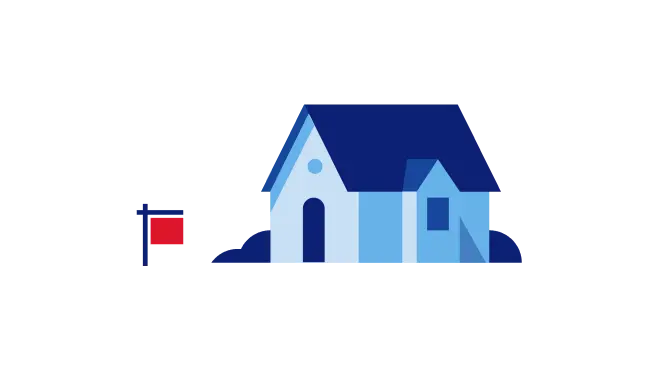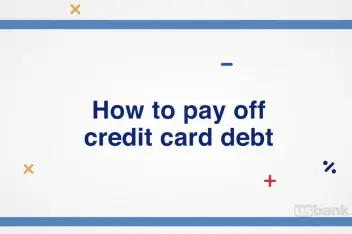
Step 1: Determine how much you want to spend on a house.
The first step in how to save for a house is deciding how much house you want to buy. Gone are the days when a 20% down payment was the norm. But a down payment isn’t the only cash you’ll need when the time comes to close on a house. And there are long-term costs to consider, as well.
Immediate costs
When it’s time to close, here are things you’ll need money for:
- Down payment (including earnest money)
- Closing costs
- Moving expenses
- Inspections
Long-term costs
These costs can exist throughout your mortgage, and may change over time:
- Homeowner’s insurance (possibly in an escrow account)
- Property taxes (possibly in an escrow account)
- Private mortgage insurance (PMI)
- Utilities, repairs and maintenance

Looking for more information on affordable housing and mortgages?
If you’re interested in down payment assistance or grant programs for homebuyers with limited incomes, check out our access to homeownership resources. Learn about mortgages you might not have heard about, connect to mortgage loan officers and find answers to even more of your homebuying questions. You can also read inspirational stories from homeowners who used affordable mortgages to successfully purchase new homes.
Step 2: Decide what your down payment should be.
In 2024 the median down payment amount for first-time homebuyers was just 9%.1 Less than you thought, right? As you plan for your own down payment, it could be worthwhile to look into payment assistance programs, or if your lender offers existing customer credits.
Is a lower down payment okay for you?
Generally, the more you put down, the lower your interest rate and monthly payment. What down payment amount are you comfortable with?
Calculate your ideal down payment amount.
Our down payment calculator can help you decide how much you want to save as you prepare for the mortgage process.
What is down payment assistance?
There are many forms of down payment assistance designed to help eligible homebuyers cover down payment costs.

Get closer to your new home.
Are you ready to start taking steps toward a new home? If your answer is yes, get an estimate of what you may be able to borrow in just a few minutes or connect with a mortgage loan officer about your mortgage options
Step 3: Find a place to keep your down payment as you save.
When you’re saving money for a down payment, it’s a good idea to keep the money somewhere that’s easy to access – like a savings account. A certificate of deposit (CD) may provide a higher rate of return, but pay attention to the required term lengths and how they may impact your homebuying schedule. Here are some accounts to get you started.
We're having trouble displaying money market account rates. It shouldn't last long, so please try again shortly.
Bank Smartly® Savings account
Enjoy competitive rates, easy access to funds and higher yields when paired with Bank Smartly® Checking.
Earn up to 3.50% APY when you are an account owner of a U.S. Bank Smartly® Checking account, Safe Debit account, or U.S. Bank Smartly™ Visa Signature® card and a combined qualifying balance (CQB) of at least $100,000.2
Enjoy greater interest-earning power, benefits similar to checking accounts and easy access to funds.
Earn up to X.XX APY when you deposit at least $25,000 into a new Elite Money Market account or an existing account that was opened within the last 30 days.8
Step 4: Look for other ways to save money and cut back on spending.
Depending on your timeline, cutting back on vacations and eating out aren’t always the best ways to save for a house. Instead, make a plan and be strategic.

Article
Where you keep your money matters.
There are a few types of accounts to choose from when it comes to saving money for a down payment on a house. Standard savings accounts and CDs (certificates of deposit) are just two such options.

Article
How to pay down credit card debt
Along with saving for a down payment, having a good relationship with credit is important in buying a home and qualifying for the best interest rates. Here are some tips on paying down your credit card debt.

Article
How much house is affordable?
A standard rule for lenders is that your monthly housing payment should not take up more than 28% of your income. However, home affordability is about more than just how much you can borrow.

Looking for more information on affordable homebuying?
Connect with coaches and mortgage loan officers, learn about mortgages you might not have heard about and find answers to even more of your homebuying questions.

